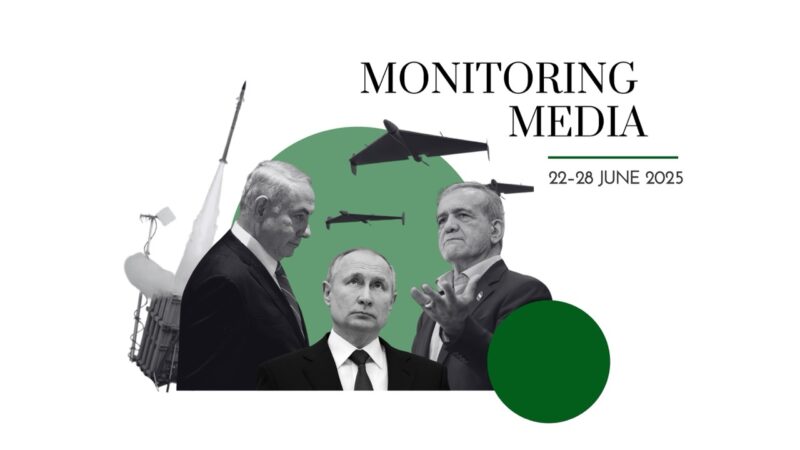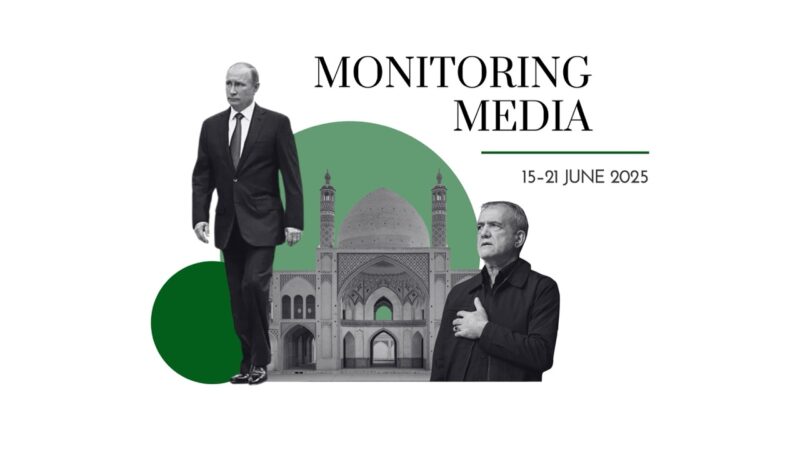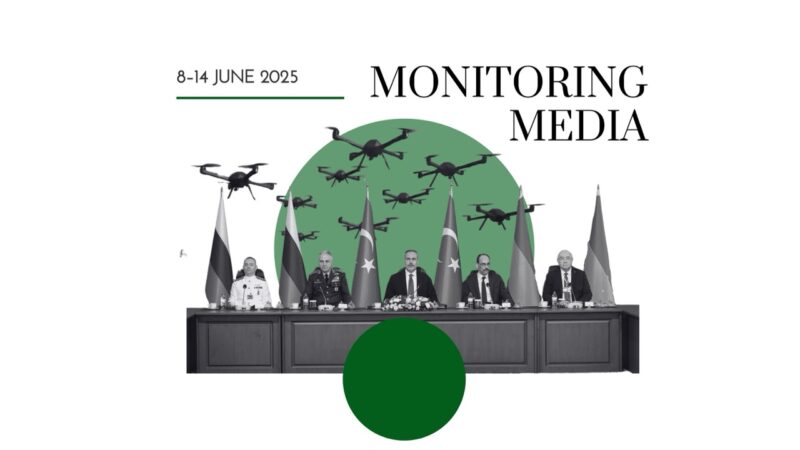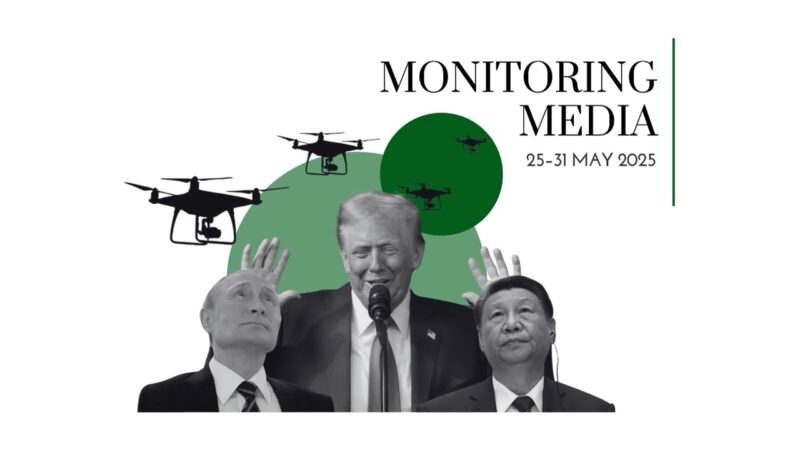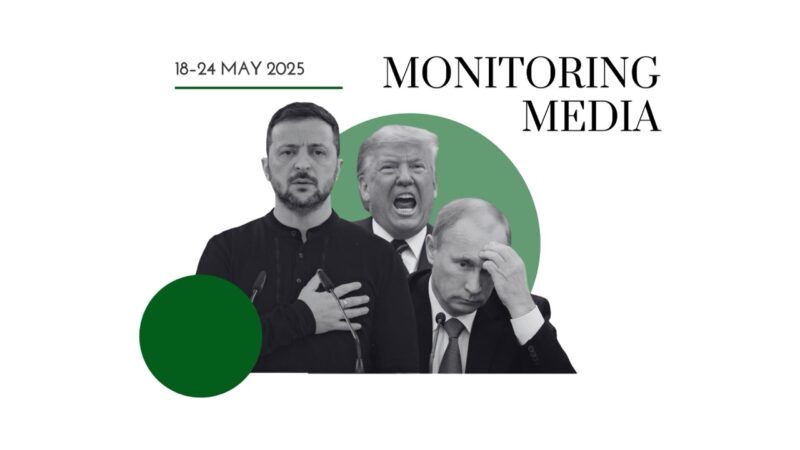Russian crimes in Ukraine: West is pushed to the point of no return

CIUS report on media coverage of Ukrainian affairs, 4–10 April 2022
Four North American online magazines (Foreign Affairs, Atlantic Council, The National Interest, and The Conversation) were selected to prepare this report on how the situation in Ukraine has been portrayed in the media during the past week (4–10 April 2022). The sample was based on their impact on public opinion as well as their professional reputation, popularity among readership, and topical relevance. Overall, the four magazines may be said to represent the centrist, liberal, and conservative political spectrum.
This report covers only the most-read weekly publications as ranked by the respective magazines themselves. Also, this report covers only texts from special sections on Ukraine; texts not belonging to Ukraine-specific sections or those with comparatively modest attention from readers were not considered.
Topics featured in the publications:
- Atrocities committed by invading Russian troops in the suburbs of Kyiv: war crimes and growing evidence of genocide
- Putin’s personal obsession with Ukraine and scenarios of his postwar political future
- Economic aspects of the Russo-Ukrainian war: the rise of cryptocurrencies, growing food and fuel crises, damage from sanctions incurred by Russia and European states
- War in cyberspace: remote sabotage of critical infrastructure, spread of disinformation on the Internet, weaponization of social media
- Unification of the West in light of the Russian aggression: responsibilities of hegemonic powers, re-emergence of the Cold War rivalry, “lend-lease” scheme to support Ukraine.
The most common arguments:
Russia committed war crimes in Ukraine that are likely genocidal. Mark Episkopos (The National Interest) refers to German intelligence data and states that the Russians are alleged to have murdered Ukrainian civilians as “part of a concerted terror campaign” rather than “the result of poor discipline or frustration among local troops.” In other words, the militarily unjustified actions were undertaken precisely to threaten Ukrainian identity and forcefully legitimize the occupation. Anastasiia Kudlenko (The Conversation) adds to this point by emphasizing that the ongoing war is one for the very survival of Ukraine, as Russia “appears set on the destruction of the country and its people.” The latter is one of the defining features of genocide.
While not calling it a genocide, Nisha Shah (The Conversation) nevertheless argues that Russia committed war crimes in Ukraine: “Russia’s use of cluster munitions and its potential to use chemical weapons, both of which are prohibited by international law, constitute war crimes. Even war has rules.” In his turn, Mykhailo Tkach (Atlantic Council) unequivocally defines the Russian murders of civilians as genocide and argues that they will continue unless the West helps Ukraine to stop Putin: “For years, Putin has stated openly that he does not recognize Ukraine’s right to exist.”
Anastasiia Kudlenko (The Conversation) declares that the massive numbers of confirmed murders of civilians make the label of Putin’s war against Ukraine no longer relevant. These were ordinary Russians, not their president, who “left mass graves and corpses of civilians with their hands tied behind their backs and bullets in their heads.” Therefore, the world today is dealing with Russia’s, not Putin’s war in Ukraine.
All the analyzed magazines and texts are inclined to provide coverage of Russians committing crimes in Bucha, Irpin, Borodianka, and other Ukrainian cities. In contrast, the Kremlin’s narrative that the crimes might have been committed by the advancing Ukrainian troops is not given any credence (see Trevor Filseth and Mark Episkopos, both at The National Interest).
The outcome of the war will define Putin’s future. Mark Episkopos (The National Interest) concludes in his analysis that Russia’s defeat is plausible. If such a defeat happens, then Russia will experience turmoil that will lead to the removal of Putin from his position of supreme power. In such a case, however, the strategic line of the Kremlin’s foreign policy would still remain intact: “there is nothing to suggest that Putin’s successor, whether democratically elected or brought to power through popular unrest, would be more inclined toward compromise with the West.” The continuity of the Kremlin’s foreign policy is based on Russia’s anti-Ukrainian and anti-Western sentiments that have been nurtured through decades.
It is worth mentioning that as of April 2022, Episkopos changed his views on the dynamics of the full-scale phase of the Russo-Ukrainian war. Namely, back in March 2022 he was among those who were inclined to believe in the eventual victory of Russia.
Thomas S. Warrick (Atlantic Council) assumes that Putin and his soldiers will be held accountable for their war crimes in Ukraine, similarly to how the perpetrators from Serbia and Rwanda were in the 1990s. War crimes, as well as crimes against humanity, have no expiration dates. Therefore, today’s international perseverance, documentation of evidence, and effort to change the global political agenda pave the way for prosecutions in future. Warrick ends with a statement: “Experience teaches that, eventually, justice will be done.” In their turn, Jamie Pringle and Nicholas Marquez-Grant (The Conversation) claim that forensic investigators are reportedly already at work in Bucha.
Putin is obsessed with conquering Ukraine. In her elaborate article, Anna Reid (Foreign Affairs) highlights logical gaps and historical misconceptions in Putin’s perception of Ukraine that led him to start the full-scale invasion. In particular, she uncovers falsities in Putin’s recent essay on the unity of Ukrainians and Russians, as well as in the statements of Kremlin elites: “Saying that Ukraine doesn’t really exist is as absurd as saying that Ireland doesn’t exist because it was long under British rule, or that Norwegians are really Swedes.” According to Reid, Putin’s obsession with Ukraine is rooted in his visions of Russia as a European empire. The loss of Ukraine from such an empire would represent the loss of Russia’s connection to Europe and, consequently, the Russian sense of self as a leader of the Slavic world.
For more information about contemporary Russian manipulations with history and features of Russian identity, we also recommend this recent essay by Volodymyr Kravchenko in Forum for Ukrainian Studies.
Danylo Lubkivsky (The National Interest) argues that Putin has already lost Ukraine. The nationwide resistance to the Russian invasion, as well as the extraordinary levels of civic support for Ukraine’s Armed Forces, discredit the Russian revisionist idea on Ukrainian soil. Lubkivsky also argues that “[Ukraine’s] return to world history and claim to a rightful place in Europe is one of the biggest fears of Russian czars, Soviet dictators, and the current Russian leadership, because it [would then force] them to do the unthinkable, which is to reform their own country.”
The “reformist perspective” provides another reason for Putin’s obsession with Ukraine: a belief that if Ukraine democratizes then Russia will follow suit. Such an outcome may be undesirable for the Kremlin as it has declared Russia to be a “sovereign democracy of non-Western type”—one that harks back to the imperial tradition of governance.
The West became unified, not fractured, in face of Russian aggression. This topic was widely discussed on the pages of Foreign Affairs last week.
Stephen Kotkin (Foreign Affairs) opens the discussion by stating that the Cold War did not end with the collapse of the Soviet Union but moved to a subsequent stage. Meanwhile, however, the foreign policy objectives and tools of the largest states remained the same: “A despot in the Kremlin has once again authorized the invasion of another small country, expecting it to be quickly overrun.” The pivotal events of today have pulled in the US, China, and Russia and reflect the geopolitical legacies and ideological dependencies of the Cold War.
Ivo H. Daalder and James M. Lindsay (Foreign Affairs) portray Putin’s decision to invade Ukraine as a “strategic miscalculation of historic proportions”—for the West has become unified as it has never been since the 1990s. The reason for that was simple: “When their tails are whacked hard enough, Western democracies react with speed, determination, and strength. For the United States and its European allies, Russia’s invasion of Ukraine…has provided just such a case.” Daalder and Lindsay argue that Putin was misled by the West’s unimpressive response to the previous wars in Georgia (2008) and Syria (2016), as well as to the 2014 occupation of Ukraine’s Autonomous Republic of Crimea and the Donbas. He overlooked a particular feature of how democracies work: according to Daalder and Lindsay, democracies are slow to anger, but “react with fury when their interests are directly threatened.”
The Russian attack on Ukraine was indirectly provoked by the West’s soft power. Robert Kagan (Foreign Affairs) speculates that since the collapse of the USSR, Washington has unwillingly become the dominant actor in Central and Eastern Europe: “Newly liberated countries, including Ukraine, turned to the United States and its European allies because they believed that joining the transatlantic community was the key to independence, democracy, and affluence…the United States and its strong alliance, merely by existing, merely by being rich and powerful and democratic, offered a very good choice indeed.” Today, the USA as the only global hegemon and defender of liberal values should not allow Russia to return Ukraine to its sphere of influence. The latter development, if it occurs, would set a destructive precedent, make Russian soft and hard power look effective (which is misleading), and discredit the West’s reputation as a consistent geopolitical actor. Instead, the victory of Ukraine is in the long-term interest of the whole Western world (see also Chris Alexander, Atlantic Council).
One of the options for assisting Ukraine to win against Russia is the US Lend-Lease scheme. On April 7, 2022, the US Senate unanimously passed the Ukraine Democracy Defense Lend-Lease Act. The Act, if supported by the US House of Representatives, will allow immediate shipments of weapons systems, ammunition, and military assistance to Ukraine. Chris Alexander (Atlantic Council) argues that “after a pause of more than 75 years, Lend-Lease is now set to be revived to ensure Ukraine repels the largest attack on a European state since 1945. This revival aims to thwart a dictator whose explicit ambition to destroy Ukraine as a state and a nation echoes the criminal goals of Hitler and Stalin.”
The Russo-Ukrainian war will have a long-lasting impact on global economic chains. Scott B. MacDonald (The National Interest) argues that besides other industries, this war will significantly affect the global supply of food, fuel, and fertilizers. Ukraine and Russia are major exporters of sunflower oil and wheat (one-third of the world’s wheat demand). With the full-scale invasion underway, the usual export channels became disrupted. Russia and Belarus are important actors in the fertilizer business as they export potash (37.6 percent of the world’s demand); both states have been subject to Western sanctions today. Finally, Russia is a large exporter of oil and gas, which are also targeted by the sanctions. This has led to global shortages in energy resources and, consequently, global inflation.
Cryptocurrency is used by Russia to evade sanctions. The gaps and weak regulations in the cryptocurrency market are exploited by the Russian government to conduct financial operations in the shadow of the Western sanctions. Simon Dermarkar and Mouna Hazgui (The Conversation) note that since the full-scale invasion began, the conversion of Russian rubles into cryptocurrency “has literally exploded.” At the same time, the Ukrainian government is also resorting to cryptocurrency to fund humanitarian and military needs. More than $100 million were collected in one day after the Ukrainian government’s official tweet for help on 26 February 2022.
Ukraine and its Western partners should not underestimate Russian cyberwarfare. David Cattler and Daniel Black (Foreign Affairs) write that “the misperception that Russia has been restrained or ineffective in the prosecution of its cyberwar on Ukraine likely stems from the fact that Russia’s cyber-operations have not had the standalone, debilitating effects that assessments before the war imagined they would have.” In other words, Russian cyber-successes are often underestimated as they are placed in the context of its overall flawed military campaign. But sabotage of Ukraine’s governmental, military, and industrial infrastructure has been considerable, despite often being futile as the Russian conventional forces advanced too slowly.
Cattler and Black warn that Russian cyber-troops may be keeping much of their potential concealed at the moment. They might also have already planted disruptive malware into Ukrainian and Western critical infrastructure: “Several Russian cyber-operations since the invasion have already had spillover effects into NATO countries, affecting critical sectors and civilian Internet connectivity across Europe.” In this light, Robert Peacock (The Conversation) outline five steps to mitigate cyber-threats in every organization: “Adopt multifactor password authentication, keep software patches up-to-date, back up data, run drills and cooperate with government cybersecurity agencies.”
Russia is investing much time and effort in attacking Ukraine in the media. Juris Pupcenoks and Graig Klein (The Conversation) argue that “Russian rhetoric – the language Russian officials use – toward Ukraine has changed over the past two decades from establishing a strategic partnership with Ukraine to delegitimizing Ukraine’s government.” In particular, in the aftermath of Putin’s speech at the Munich Security Conference (2007) and on the eve of the Russian-Georgian war (2008), Ukraine began to be portrayed as a threat to the Russian-speaking world and a state harbouring neo-Nazis. Eventually, the Kremlin’s singular intention to “denazify and demilitarize” Ukraine, long at the core of a targeted disinformation campaign, fuelled its full-scale invasion in 2022.
Ahmed Al-Rawi (The Conversation) explains how Russia continues to spread disinformation in Canada following the ban of the RT news channel. The major tactical channels include a massive surge of pro-Russian accounts on Twitter, media attacks on objective Canadian politicians by the Russian diplomatic mission, accusing independent media outlets of “fake news” for merely publishing impartial information on Ukraine, creating pro-Russian state-controlled “fact-checking” media, and others. Added to this, Anton Oleinik (The Conversation) provides empirical evidence that Russian disinformation messages are being formed with invented fake descriptors (e.g., special operation instead of war) and are ignoring unfavourable facts.
Worth Your Attention
The 2014 War in the Donbas was ignited by local separatists. Juris Pupcenoks and Graig Klein (The Conversation) argue that “the turmoil [Euromaidan Revolution of 2014] spiraled into the outbreak of armed conflict by pro-Russian separatists in eastern Ukraine and Russia’s annexation of the portion of Ukraine known as Crimea in 2014.”
In just one sentence, Pupcenoks and Klein convey a few crucial misconceptions.
Primarily, they seem to define the Euromaidan as one of many Ukrainian turmoils, altogether discarging a pivotal role the nationwide protest against the corrupt pro-Russian government at a time, now known as a ‘revolution’ played in the adoption and further advancement of a pro-European democratic orientation in Ukraine.
Secondly, the 2014 War in the Donbas is portrayed as an armed conflict regardless of the documented acts of aggression (war) on the side of Russia; the definition of these acts was provided by the UN General Assembly Resolution 3314 (XXIX), Article 3. In this light, the Russo-Ukrainian war actually started on February 23, 2014, with the first day of the occupation of Crimea, not on February 24, 2022.
Thirdly, they argue that local pro-Russian separatists initiated the armed resistance to the Kyiv government in eastern Ukraine. Instead, the evidence reveals the direct engagement of Russian special services and troops in the assault on Ukrainian sovereignty.
Fourthly, Pupcenoks and Klein prefer using the word annexation not occupation with respect to Crimea, obscuring its aggressive, military and illegal nature. From the perspective of international law, Crimea is indisputably occupied territory; annexation came as the outcome of occupation.
Finally, they define Crimea in neutral terms as a portion of Ukraine instead of using the more precise geographical term Ukrainian peninsula or its political descriptor Autonomous Republic.
The absence of independent media is what makes the Russians support Putin. Monica Duffy Toft (The Conversation) criticizes the Western sanctions against Russia and points out their negative impact on ordinary citizens: “sanctions are also indiscriminate. They affect leaders but also innocent civilians. And the harm lingers even after the target gives in, reinforcing the narrative that Russia is the victim here, being targeted by the West.”
At the same time, Duffy Toft argues that the RF citizens’ legitimation of the Kremlin’s policies is paradoxical: “Putin seems to have domestic support on his side. A recent Levada poll shows that his approval rating has shot up from 71% in February to 83% since the invasion of Ukraine.”
Duffy Toft concludes that the legitimacy of Putin is only a matter of the Kremlin’s control over the media: “If Russians learn the truth, Putin’s leadership could come into question just as Soviet leader Mikhail Gorbachev’s did after the withdrawal of Soviet troops from Afghanistan in 1989.”
In her argument Duffy Toft relies on her own and overall Western assumptions and understandings of how a democratic state and its society may behave in the context of free and democratic media. These assumptions are rooted in Western political traditions and cultural values that highlight the freedom of speech and political tolerance. Informed by the period of Enlightenment, enduring respect of such values is something that Western nations achieved over a long course of time. In the Russian society on other end, democratic traditions have not had a chance to get fully developed. Russia enjoyed a relatively short period of democratic development since the collapse of the USSR in 1991 and until the arrival of Putin onto the political scene as the Russian leader in 2000. Duffy Toft transforms her ethnocentric bias onto the Russian society expecting the Russian society to evolve from its centuries old imperial and totalitarian pasts into a mature democracy in a very short period of time.
Returning to the question of accessibility to the media, all through Putin’s years in power, the Russians have had free access to the Internet and could double-check facts and/or obtain information from alternative sources. The Statista survey reveals that “55 percent of young media consumers between 18 and 24 years old in Russia used online media as their main news source” (data valid for 2021). All Russian citizens also enjoyed access to a variety of traditional media (newspapers, radio and television channels) that functioned in opposition to the Kremlin.
Regardless of high numbers of Internet users, it appears that very few Russians developed a tradition to double-check facts on the Internet and/or believe the Internet media in the first place. Also, only a few Russians found the opposition media important enough to protest against the “Foreign Agents” law that ousted independent journalism in 2012 and 2017.
Therefore, through their tacit consent, the majority of the Russian citizens supported the deterioration of all Russian media into Kremlin mouthpieces. In this light, claiming that the Kremlin elites would lose their legitimacy as a just-minded Russian society “learns the truth,” as Duffy Toft claims it, seems disingenuous.
